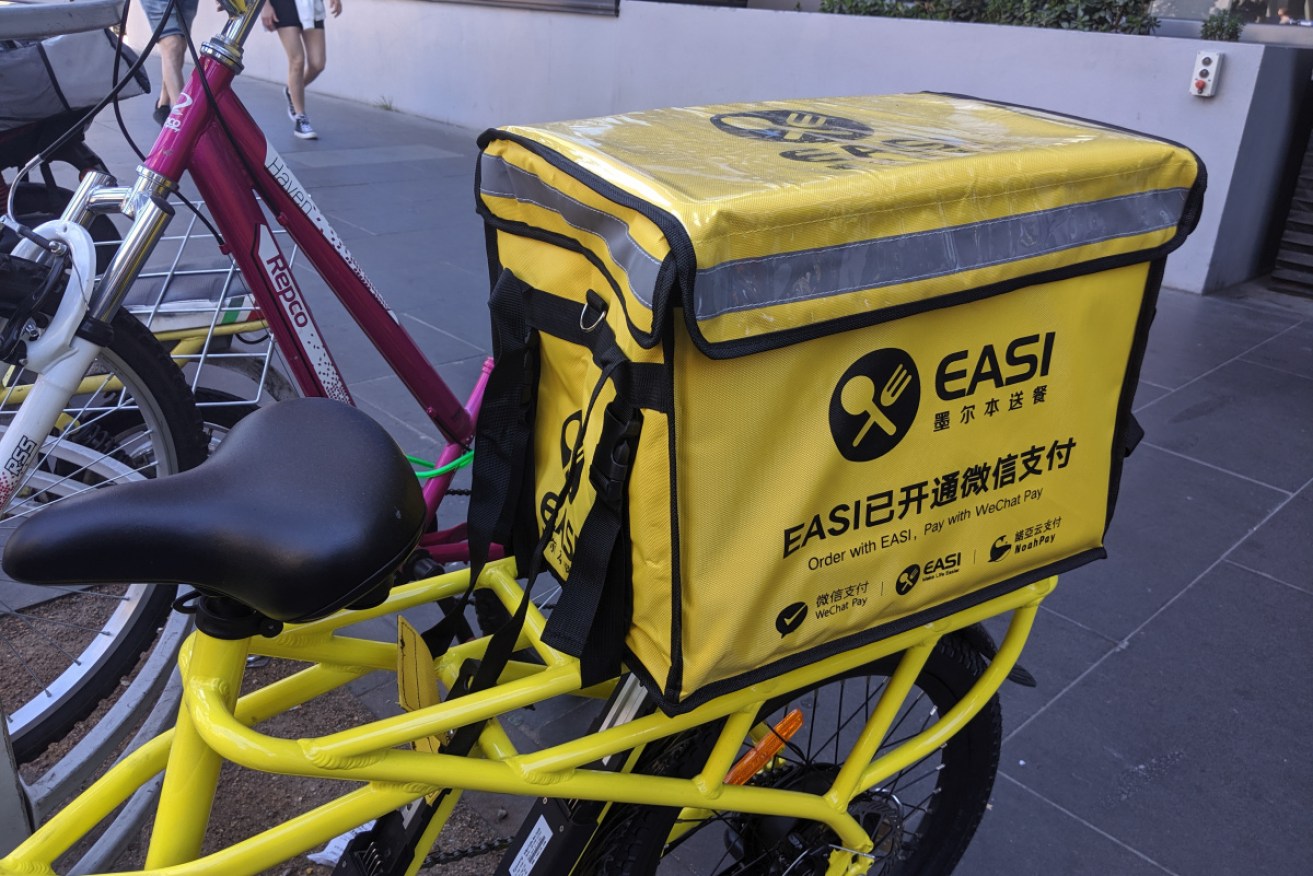Rise of illegal electric bikes could be adding risk to food delivery services


Workers and industry experts alike have raised concerns about the way electric bikes are being pushed on food delivery services employees. Photo: David Ross
Food delivery riders are using illegal electric bikes that travel in excess of current speed limits, many of which are rented from third parties and branded by major food delivery companies.
Electric bikes are limited to 25km/h in Australia, but The New Daily was told by an electric bike rental business in Melbourne, which services two major food delivery companies, that its bikes could go as fast as 40km/h.
The company said it didn’t modify the bikes, it just rented what it was supplied from overseas.
Riders travelling at that speed are at serious risk of death or injury, Marilyn Johnson, senior researcher at Monash University’s Institute of Transport Studies told The New Daily.
Dr Johnson said road rules needed to be enforced, to stop food delivery drivers being seriously hurt or even killed.
“I have no problem with the law being enforced with people behaving in an unsafe way,” Dr Johnson said.
She told The New Daily “cyclists are not the sacred cow” and if we wanted to improve safety and stop deaths on the road it may be a matter of enforcing the rules.
Four food delivery riders have died this year alone, two of which were confirmed to be UberEats riders from Taiwan.
Many have also been injured, with The New Daily noting no one appeared to be paying attention to those numbers.
Several bike couriers who The New Daily spoke to at recent protests at Deliveroo’s Melbourne headquarters, organised by the Transport Workers Union, said they could be penalised by the food companies for not using their phones on the road or completing the delivery too slowly.
“When we get an order we get one minute to accept. Rejecting is much harder, so I need to stop to use my phone. But maybe sometimes I just use it on the bike,” one rider said.
Using a phone while riding a bike, just like in a car, is illegal.
Penalised for not breaking the law
At the recent protests in Melbourne the food delivery company EASI came in for mention as a bad actor in the industry, which has been previously accused of underpaying workers and setting aggressive delivery times that required riders to speed and ride dangerously.
EASI, which is owned by Australian Delivery United Group, rejected any assertion its riders used bikes that were in breach of electric vehicle laws.
A spokesperson said, “EASI do not work with bike suppliers, and riders have absolute freedom in choosing their own vehicles or vehicle suppliers”.

EASI delivery service in Melbourne has been accused of underpaying its workers. Photo: David Ross
When asked why bikes with EASI’s branding were being rented to riders, EASI declined to comment, saying it was an issue for the rental businesses.
The company spokesperson said: “It is for advertisement purposed, and I believe a lot of riders who are on these bikes are not even working with EASI.”
The New Daily tried to speak to several EASI riders in Melbourne, but all declined.
Another rider, who now rides for a competitor, said EASI asked riders to dob on other riders if they were not wearing the uniform or using the correct food boxes.
“You get caught then you stop getting orders. No orders no pay,” he told The New Daily, asking to remain anonymous.
He said he was aware EASI had imported several hundred bikes for its riders, which were capable of travelling at 40km/h.
“For years nothing has happened to them and no one cares,” he said.
Enforcing the rules may be what’s needed
That’s not to mention the numbers of bikes fitted with aftermarket electric motors, with significantly higher watts than the current 250-watt limit.
Conversion kits to power bikes up to 1000 watts are easily available online on such stores as Pirez, marked for “off-road” use only.
Several bike mechanics told The New Daily they had seen bikes used by food couriers fitted with the engines or existing motors modified to go faster than the 25km/h limit.
One bike shop owner in Melbourne said there was a danger to riders of chains snapping when using these kits, and that many don’t have brakes for stopping at high speeds.

Electric bikes used by food delivery drivers line a busy Melbourne street. Photo: David Ross
“It’s not just that these bikes are overpowered – they’re putting them on bikes that aren’t designed to handle the related issues on overpowered engines,” he said.
Bicycle Network CEO Craig Richards said there was a lot of talk about limiting the maximum speed of electric bikes, but it was important to make sure the vehicle stuck to the 250-watt power standard.
“It’s important to remember that an (electric bike) is something that requires the rider to pedal for it to move,” Mr Richards told The New Daily.
“That’s distinct from a machine that the rider just sits there and the bike moves when they use the throttle. Those machines are really motor bikes, not bicycles.”
Extra training no solution
Professor of Urban Transport and Public Health at The University of Melbourne Mark Stevenson said attempts to improve driver and rider training, such as those being implemented across the food delivery sector, have been shown to increase risks in unexpected ways.
“We know from good systematic reviews that driver behaviour and skill trainings does very little,” Professor Stevenson said.
“What it does is provide greater levels of confidence that places them at greater risk.”








